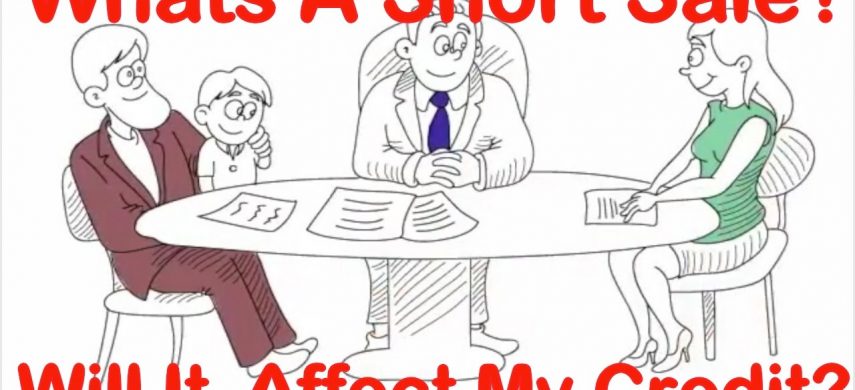
While the real estate market is rebounding from the worst housing crisis to hit the United States since the Great Depression, hitting homeowners the hardest from 2007 to 2009, many people are still struggling to stay afloat financially and pay their mortgages. As unfortunate as it is, short sales continue to account for a larger-than- desired part of the nation’s home sales.
A Short Sale is a Better Option Than a Foreclosure
For homeowners who aren’t able to make their mortgage payments, a short sale can seem like an attractive option. But there are some things to keep in mind if you’re considering to opt for a short sale instead of a foreclosure. While a short sale can have a major impact on your credit rating – even as much as a foreclosure – it only impacts it by a few points in most cases. Before short selling your property, though, you need to carefully assess your specific situation.
What to Consider When Debating Whether to Short Sell Your Property
There are a few considerations you have to take into account before finally deciding to short sell your property. For instance, how many mortgage payments have you already missed? Also, how will your lender report the short sale? If you haven’t missed any mortgage payments and have a good credit history, you might be able to negotiate to have the short sale listed as paid as opposed to settled. In this case, your credit score might not be negatively impacted at all.
If you are considering a short sale, talk to the Law Offices of Stephen K. Hachey. We examine all the details of your case and be with you every step of the way.
Stephen K. Hachey can help you wade through this difficult process to reach a positive solution. Call 813-549-0096 today!
***The opinions in this blog are those of the author whom takes full responsibility for the content. Like all other content on the site, this does not constitute legal advice and is for general information purposes only.***
Thanks to a spending bill signed by President Obama on Dec. 18, 2015, the Mortgage Forgiveness Debt Relief Act has been extended to Dec. 31, 2016. The extension will also retroactively cover mortgage debt that homeowners canceled in 2015.
The Mortgage Forgiveness Debt Relief Act helps homeowners avoid paying taxes on home mortgage debt that has been forgiven. In normal circumstances, any mortgage debt that has been forgiven by a lender is considered taxable income.
Initially passed in 2007, the Mortgage Forgiveness Debt Relief Act states that up to $2 million can be forgiven and not taxed if: the house has been the primary place of residence for at least two out of the last five years; or the homeowner has used the debt to add improvements and make upgrades to the home.
Unfortunately for anxious homeowners, this is not the first time that an extension of the MFDRA has come down to the wire and left them holding their breath. In 2014, President Obama didn’t sign an extension until December 29.
The good news is that this year’s extension will not only apply to short sales that took place in 2015 but also the ones that will take place in 2016. Previous extensions of the MFDRA only covered short sales from the preceding year.
There is no doubt this extension is a huge relief to homeowners who have faced financial burdens in the past few years, easing concerns that they might have had to move forward with a short sale.
Stephen K. Hachey, a Florida real estate attorney, can help your wade through this process and determine a positive solution. Contact him at 813-549-0096.
The opinions in this post are solely those of the author. The author takes full responsibility for the content. Like all blog posts, this is offered for general information purposes and does not constitute legal advice.
Selling a home can be tough, especially over time when the market and economy changes. Leftover mortgage payments can cause house selling to be a tough task, for no one wants to have existing debts with the bank. For this reason, short sale becomes the best option. A short sale is an agreement with the bank and owner to sell property for less than what the owner’s debt is and omit any unpaid balance owed.
While this method can be a beneficial way to relieve heavy debts, it comes with restrictions. When finishing a short sale, the owner and the buyer sign an Arms Length Affidavit, signifying that that no buyer/seller agreements have been made and that the seller is bargaining in their own interests. Signing this document also states that the buyer is an unrelated third party. If relatives were permitted to buy short sale home, there would be a high potential for mortgage fraud, as it would very likely that the relative would buy the home simply to relieve another of high debt.
In simpler terms, it is illegal for an individual to make a short sale with a relative. Doing so can result in a fine and/or jail time. While this method can be successful if a relative is distant enough to not reveal any relations, it is a risky move and should be taken very seriously as the consequences can be severe.
New buyers are always looking to get a good house for an even better price; the benefits of selling to a relative aren’t worth the costs. But if you wait for the right time, the right people will come and buy your house to help with your debts.
Stephen K. Hachey, a Florida real estate attorney, can help your wade through this process and determine a positive solution. Contact him at 813-549-0096.
The opinions in this post are solely those of the author. The author takes full responsibility for the content. Like all blog posts, this is offered for general information purposes and does not constitute legal advice.
Short sales are transactions in which proceeds from the sale amount to less than the balance owed on the property. Though short sales can be a fiscally smart and a radically less agonizing option when facing foreclosure, it is not possible to have a related party purchase your property in a short sale. These transactions are typically used as an alternative to foreclosure in order to alleviate expenses for both homeowners and lenders and more often than not occur after a borrower’s failed attempt to modify their mortgage loan in order to remain in their home.
In short sales, banks require that transactions be executed at “arm’s length;” that is, all parties to the transaction must be independent and on equal footing. For example, a transaction in which your friend or relative offers to purchase your underwater property at fair market value in order to work out a rental or re-sale agreement that would allow you to continue to live in your home would not be considered an arm’s-length deal and result in the lender invalidating the transaction. In a scenario like the latter, the seller stands to benefit greatly, and as the law dictates, sellers cannot profit from a short sale.
Arm’s-length policies have become more stringent since the housing market crash due in part to real estate scam artists taking advantage of the housing market’s economic downturn. Unfortunately for honest, hardworking homeowners suffering financial losses through no fault of their own, these policies can seem heavy-handed and unfair. However, because short sales are high-risk transactions by nature, lenders have implemented these strict policies to protect their assets from mortgage fraud.
This post was written by Stephen Hachey. Follow Stephen on Google, Facebook, Twitter & Linkedin.
Although reports show that the economy is slowly climbing its way back up, there is still no shortage of homeowners facing foreclosure and short sale. This is a very troubling time, especially if you bought your home thinking that you would be able to refinance it, if you ever found yourself in a financial emergency. But with the crash of the housing market and the drop in home prices, many found themselves with no equity to be able to do so. In this event, it seems that renting is the only option. But is it?
Your ability to purchase a home after a foreclosure or short sale really depends on your credit score. When your house goes in to foreclosure, your credit score is greatly impacted. In order to get approval from a lender for mortgage, the lender generally likes to see a score of at least 620. But even then, down payments are going to extremely high and your interest rate may make the purchase not even worth it.
And aside from your credit score, lenders will see the foreclosure in your credit history (missed mortgage payments, ect). This typically will lead a lender into refusing to give you a mortgage. If you were lucky enough to not have the foreclosure reflected on your credit score yet, foreclosures are still viewable by public record and many lenders will pull this record before making their decision.
If you were able to do a short sale rather than foreclose on your home—this is often a better option—your chances of purchasing a house after a short sale are much higher than after a foreclosure. Studies show that there may be little to no waiting period after a short sale unlike a foreclosure that may take up to three years.
This post was written by Stephen Hachey. Follow Stephen on Google, Facebook, Twitter & Linkedin.
When it comes to buying or selling a house, taking on an agent can be a major decision. In some cases, an agent may make the entire process easier for you, but in other situations, using an agent may not be cost practical. Below is a list of pros and cons to carefully consider when buying or selling a home.
Selling a Home Pros
A real estate agent has access and knowledge of all the various ways to market your home. He or she will be able to make your home very visible in the market.
This isn’t their first rodeo. A real estate agent will know the ins and outs of selling your home and be able to give you practical advice on the asking price and how to state your house. The agent will also know how to properly show your home and interact with potential buyers.
When an offer has been accepted, a real estate agent will be able to guide you through the process and ensure all legal documentation is completed.
The real estate agent will be able to show your home even if you are unable to be there making your house.
Selling a Home Cons
You will have to pay your agent a certain commission based on the final closing cost. While you may think this ultimately works out for you because the agent will aim to sell the house for as much as possible, they will still be anxious for a paycheck and may cut out your bottom line.
The agent doesn’t need to make your house a priority to sell. He or she can continue selling other houses while your house sits on the market for months.
Buying a Home Pros
Outside of information you can gain online about available houses, an agent will be able to give you more in depth information like the school system, property values, real estate law and other aspects of the process. They may even be able to help you find a mortgage.
You will not have to be super flexible to view homes. An agent has access to show homes even if the seller and their agent are not available. With out the agent, you may not be able to see many homes in one day and you will have to work around when the seller or their agent are available or open houses where there are other potential buyers.
Agents can prepare legal documents and go over them in depth with you. If you don’t use an agent, you may have to seek legal help and have documentation put together by a lawyer who could charge you by the hour.
Real estate agents can negotiate on your behalf without emotions getting involved.
Buying a Home Cons
With all the information online about recently sold homes and homes for sale, it may not seem cost effective to pay an agent for information you can access on your own.
Because the agent has a financial interest in the deal—commission—they may push you to choose and make an offer on a home before you are truly ready.
This post was written by Stephen Hachey. Follow Stephen on Google, Facebook, Twitter & Linkedin.
It can be difficult to think of foreclosure as a reality. When the economy is going through tough times, we feel it, and it can spell disaster and heart break for families that are threatened with foreclosure. However, there are several alternatives to foreclosure that you may want to look into. Here are a few to explore if you find yourself in this situation.
The first is Loan Modification. This is for homeowners who can pay a portion of their loan amount but not the whole thing. In this situation, the individual and the bank agree on a lowered monthly payment that the homeowner will pay in monthly installments. It sounds easy, but it can be a lengthy process, and even though the bank will let the homeowner pay reduced amounts each month, the interest rates may be higher or the length of the loan may be lengthened to make up for the altered plan.
The second is a short sale. This is a situation where the homeowner sells their property for less than the debt they owe on the property and the bank “forgives” the rest of their debt on the property. To prove that you are eligible for a short sale, you will need to prove that you are in severe financial hardship, you don’t have enough money to cover the remainder of your debt, and your home is worth less than the amount you owe to the bank.
The last is a forbearance. This is an alternative to a foreclosure where the bank allows the borrower to pay a lower amount than what they owe for a certain period of time. The conditions are such that you are experiencing a temporary financial hardship and you have not missed any previous mortgage payments.
These are just a few alternatives to consider if you are facing foreclosure. Stephen K. Hachey is a Florida real estate attorney who can help you make the choice that right for you and your family. Contact him at 813-549-0096.
This post was written by Stephen Hachey. Follow Stephen on Google, Facebook, Twitter & Linkedin.
When homeowners realize they cannot keep up with their mortgage payments, and loan modification is not an option, there are still ways to avoid foreclosure. Thanks to the Home Affordable Foreclosure Alternatives program (HAFA), homeowners can work with their banks on other ways out of the property. One popular way to avoid foreclosure is through a short sale. Short sales are conducted when the owner of a property sells it for less than what they owe on the mortgage. Your lender must approve this sale, and thanks to HAFA, many more lenders are willing to work with their borrowers to initiate and close on short sales.
A borrower will have to agree to the terms put forth by the lender when they take advantage of a short sale or other remedy through HAFA. However, it is often worth it. Not only will you protect yourself from foreclosure, you will also not have to worry about the lender pursuing you for whatever balance remains on your loan. Your credit will be damaged from a short sale, but not as much as it would have been if the foreclosure went forward.
Talk to your lender about your options. If you can, modify your loan so that you can catch up with and afford your mortgage. If that is out of the question, try to get a short sale approved through HAFA. You will end up saving money in the long term, and you will not have to worry about the emotionally frustrating foreclosure process. These options can seem complicated at times, Stephen K. Hachey, a Florida real estate attorney, can help. Contact our offices at 813-549-0096.
This article is for general informational purposes only and does not establish an attorney-client relationship. Please contact a licensed attorney in your state of residence. For more information on our services, please visit our website at www.floridarealestatelawyer.org/
This post was written by Stephen Hachey. Follow Stephen on Google, Facebook, Twitter & Linkedin.
When you declare bankruptcy in Florida, you know your credit is going to get bruised. It will take you a long time to build that credit back up, and if you are losing a home in your bankruptcy, it will be an even longer time before you can qualify for a mortgage again. In order to mitigate the damage, many homeowners are choosing to do a short sale after their bankruptcies. This is an excellent alternative to foreclosure, especially if your bankruptcy is already discharged.
The benefits are numerous. For starters, you will get more time in your house if you unload it in a short sale rather than a foreclosure. It will take a little more time to negotiate the deal and arrive at the date that you are required to move out. Another benefit is the amount of time before you can get another mortgage. When you sell your house in a short sale, there will be about two years that you have to wait before you can qualify for another mortgage. A foreclosure following a bankruptcy will require a longer waiting period.
If you are trying to decide whether to short sell your home after a bankruptcy, talk to an experienced foreclosure attorney. Stephen K. Hatchey, a Florida short sale attorney, understands foreclosure law in Florida will be able to help you make the best decision for your property and your financial future. To receive a free consultation, contact our offices at 813-549-0096.
This post was written by Stephen Hachey. Follow Stephen on Google, Facebook, Twitter & Linkedin.
Thanks to the signing of the National Mortgage Settlement in February of 2012, homeowners may owe less on their mortgages than they did previously. This settlement, which came as a result of the robo-signing scandal that showed banks were rushing through the foreclosure process on many homes without bothering to pay attention to the paperwork, has provided over $20 billion in aid to homeowners so far. Homeowners are able to take advantage of this settlement by modifying their mortgages or by avoiding foreclosures with short sales. A short sale is typically better for your credit rating than losing your home to foreclosure. However, both a foreclosure and a short sale will leave you without a home. While the settlement was intended to keep people in their homes, that is not happening as often as it should.
When you try to negotiate with a bank or lender, you can get them to reduce the principal on your first mortgage, or even forgive a second mortgage. If you cannot get a second mortgage forgiven entirely, you might be able to get a reduction on that mortgage as well. The National Mortgage Settlement has required banks such as Bank of America, Wells Fargo and Citigroup to help homeowners dig out of upside down mortgages and avoid foreclosure. If you are not sure whether you would be better served negotiating with your lender or losing your home, talk to an attorney like Stephen K. Hatchey, who specializes in short sales, foreclosures and the mortgage settlement. Contact him at 813-549-0096.
This post was written by Stephen Hachey. Follow Stephen on Google, Facebook, Twitter & Linkedin.





